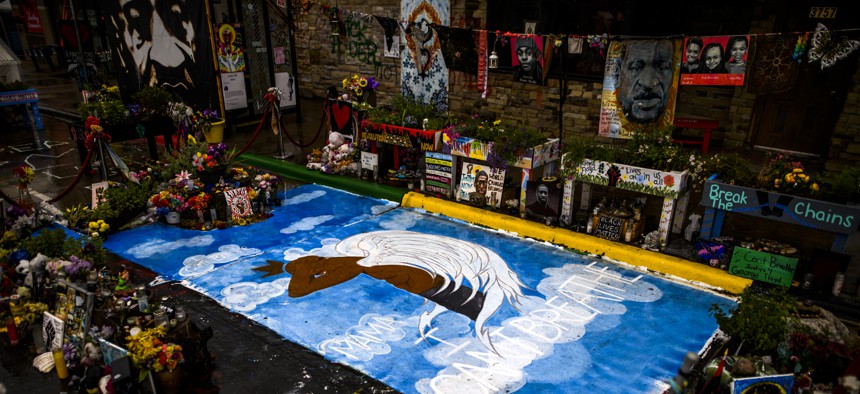Why Local Action Is Important to Combat Police Brutality and Racial Injustice

The memorial site where George Floyd was killed now known as George Floyd Square on May 25, 2022. Getty Images/Stephen Maturen
COMMENTARY | George Floyd's brutal murder two years ago did not inspire bipartisan federal action. Cities have stepped up and are driving a range of reforms.
Two years ago, George Floyd’s murder sparked national outrage, international uprisings and demands for action around public safety, policing and racial equity. While initial hopes that the tragedy might lead to sweeping reforms at the national level were high, those hopes have faded.
Mr. Floyd’s death illuminated what many people of color, and more specifically Black men, already knew: That people can live in two different Americas at the same time due to institutional and structural racism. As we sit here today, two men of two completely different backgrounds (one Black and one white), we have come to the same conclusion: We must continue to push our country to achieve comprehensive and lasting change.
We had hoped George Floyd’s tragic death would have inspired bipartisan federal action, but it hasn’t. Nevertheless, change is happening. Dozens of cities and the people living in them have stepped up, the results of which include a range of reforms aimed at combating police brutality and racial injustice.
At least 33 of the 100 largest cities in the nation have implemented some form of police reform since 2020. Some of these reforms have been limited, such as banning chokeholds during confrontations. Others have been more comprehensive, including ending qualified immunity for officers and requiring officers to undergo evaluations and take trainings to address racial bias.
Cities like Berkeley, California and Brooklyn Center, Minnesota are working to remove police from traffic enforcement. Sparked by the deaths of individuals in what should have been routine traffic stops, these actions can shape the future of nonviolent traffic enforcement nationally.
Many cities are also planning, implementing and enhancing community response models to address mental health and substance misuse in therapeutic ways. Removing police from calls where other services are needed frees up officers to focus on criminal behavior, connects residents to the help they need faster and reduces the chances of a situation escalating into a needless death.
A good example of this approach is the Denver STAR (Support Team Assisted Response) program. STAR is a mobile unit of mental health professionals who provide crisis response to members of the Denver community dealing with issues such as depression, poverty, homelessness, substance abuse or suicidal thoughts. During its first year, STAR responded to 1,396 calls, which resulted in no arrests, injuries or need for police backup.
An example of racial healing involving restorative justice comes from Evanston, Illinois, which has become the first U.S. city to approve a reparations program for eligible Black residents. The program is focused on housing and allows eligible households to collect $25,000 for home repairs or a down payment on a new home. The hope is that this program will help build the wealth of Black residents, increase their homeownership rates and improve the retention rate of Black homeowners in the city.
As leaders of nonpartisan organizations created to help elected officials, we’re also working to do our part. At the National League of Cities, we established the Race, Equity And Leadership (REAL) department to provide tools and resources to help local elected leaders build safe places where people from all racial, ethnic and cultural backgrounds thrive socially, economically, academically and physically. We are helping local leaders listen to the voices of their communities, assess how they measure up and envision what equitable cities can look like.
In 2021, NLC convened a group of bipartisan elected officials via the Reimagining Public Safety Task Force. Their work resulted in two reports: a set of five recommendations for city leaders and a subsequent toolkit that included local examples and resources for cities. Through this work, cities can uplift, adapt and develop initiatives that promote community-driven safety efforts.
The National Civic League is working with two different groups of city managers who are learning together about tools and strategies for racial equity and police reform. The International City/County Management Association has created a discussion group of local racial equity officers, which are increasing in number daily as cities focus their work on equity.
Although there is good work being done across the country and there is evidence that these efforts are working, there is still much to be done. Despite many good intentions, the pace of police shootings in 2022 remains about the same as it has been since at least 2015.
For there to be widespread change, equity needs to be ingrained into all our systems and institutions. The successful work in the cities mentioned above began as community initiatives, with people pushing for change and leaders responding. Although we are not where we had hoped to be after this incident shook our country to its core, it's never too late to strive for a better America.
Clarence E. Anthony is the chief executive officer and executive director of the National League of Cities, and previously served as the mayor of South Bay, Florida. Doug Linkhart is the president of the National Civic League and a public policy expert who has worked on every side of civic engagement.
NEXT STORY: Dangerous Tick-borne Diseases Could be Creeping Nearer to You





